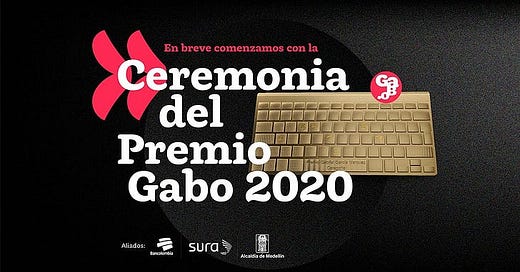Hola, this is Barbara. I have some fresh cultural news from the Spanish-speaking world for you, this time with a focus on Colombia. Despite the ongoing pandemic, literary awards and festivals are good occasions to celebrate culture. So, feel free to share these news.
The Premio Alfaguara 2021 goes to Pilar Quintana
The Premio Alfaguara is one of the most prestigious commercial literary awards for an unpublished work of fiction. This year’s Premio Alfaguara was awarded to Colombian writer Pilar Quintana (Cali, 1972) for her novel Los abismos. The award comes with a cash prize of 175,000 USD, a sculpture by Martín Chirino and the publication of the novel in all Spanish-speaking territories. That’s quite something, isn’t it?
The novel is narrated by a girl whose mother, if she had had the opportunity to choose, perhaps would not have decided to be a mother, but would have decided to lead another type of life. Trying to understand the conflictive relationship between her parents the girl suspects that she maybe was not wanted. As Quintana points out in one of her interviews, today’s women have more liberty to choose if they want to become a mother or not, but in her mother’s generation this was way different. Some women of the previous generation studied, but the social mandate for them was clear: They had to get married and be mothers. Quintana tries to show maternity of well-educated women from an angle that has rarely been tackled before in her new novel.
This year, Colombian writer Héctor Abad Faciolince presided over the jury also consisting of his writer-colleagues Irene Vallejo and Ana Merino, journalist and writer Xavi Ayén, the international director of the Hay Festival, Cristina Fuentes La Roche, journalist and bookseller at Nollegiu in Barcelona, Xavier Vidal, and the editorial director of Alfaguara, Pilar Reyes (the latter one participating, but without vote).
Pilar Quintana is a well-established name in the literary scene of Colombia. The award will boost the distribution of her writings in other Spanish-speaking countries and beyond. I have mostly known her for her collection of tales Caperucita se come al lobo (2012, in English: Little Red Riding Hood Eats the Wolf). I also follow her on Twitter: @pili_quintana.
If you wish to know more about Pilar Quintana and her writings, you may wish to listen to this podcast edition, in which journalist Jairo Patiño interviews her:
Hay Festival Cartagena de las Indias
Of course, Pilar Quintana will also attend this year’s Hay Festival in Cartagena de las Indias. On January 31, 2021, she will speak with writer and literary critic Bernardine Evaristo. Evaristo’s latest book, Girl, Woman, Other, shared the 2019 Booker Prize with Margaret Atwood.
I have always longed to go either to Cartagena or to Jericó to attend the festival, but haven’t made it yet. It seems the pandemic makes it possible for all, no matter where we are and how much money we have: This year’s edition of the Hay Festival in Colombia will be digital and free. The festival started on January 22 and will last until 31st of January. The digital events at Cartagena will be from January 28 to 31. Here’s the complete program: https://www.hayfestival.com/cartagena/home
The only disadvantage Europeans have to cope with is the time difference, but many events start at 10.30 AM (GMT -5) already, which makes them very accessible. I won’t miss the humid heat in Cartagena, but I for sure will miss the people, the atmosphere, and the serendipitous conversations that happen during such events. Anyway, I would probably have chosen Jericó as preferred event location given its relative proximity to Medellín.
Which talks are you looking forward to?
Premio Gabo de periodismo 2020
On January 21, 2021, the best pieces of journalism of 2020 all across Ibero-America were chosen during a splendid award ceremony. Every year the Fundación Gabo, established by Colombian nobel laureate Gabriel García Márquez in 1995, names the best pieces to honour relevant, rigorous, ethical, and innovative journalism that reflect the complex realities of the region.
For all of you who missed the ceremony, here is a summary of the winning teams and categories:
Text category: “Venezuela, o paraíso dos contrabandistas” (Venezuela, The Smugglers’ Paradise), published in InfoAmazonia, Miami Herald, Runrun.es, De Correspondent, and Correo del Caroní.
Image Category: “Defensores de la selva” (Rainforest Defenders), published in the Spanish newspaper El País.
Coverage category: “Frontera Sur. La frontera desconocida de América” (Southern Border: America’s Unknown Border), published in the Spanish newspaper El País and El Salvador’s El Faro.
Innovation category: Radar Aos Fatos (Straight to the Facts), published in Aos Fatos.
What do I take from these winning teams? It seems high-quality journalism is collaborative and multi-modal. That’s a good development.
If you have 90 spare minutes, here’s the tinned version of the award ceremony.
This is all for now. You will get a new collection of cultural news on February 11. If you have feedback for me or ideas for interesting content, please, let me know.
Final editing: Klosters/Switzerland, January 26, 2021, 06.40 PM CET.


